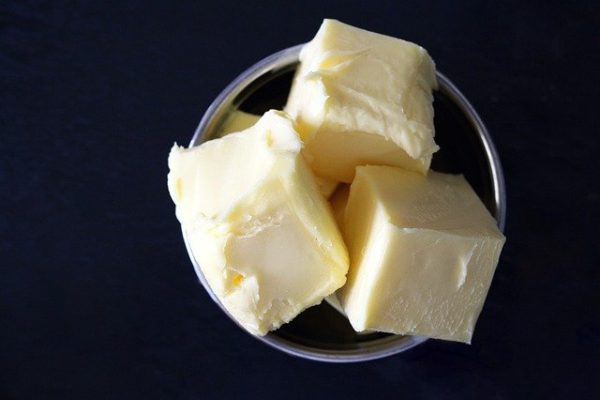 Has there ever been a dog that hasn’t gotten to the butter once in a while? Butter smells salty. It’s fun and creamy to lick. It feels like peanut butter, which we all give our dogs.
Has there ever been a dog that hasn’t gotten to the butter once in a while? Butter smells salty. It’s fun and creamy to lick. It feels like peanut butter, which we all give our dogs.
When it finally happens, you are going to ask, “Can dogs eat butter.” The answer is as complicated as the difference between can and should.
Is Butter Ok For My Dog?
Can your dog eat butter? Sure, though it’s not the best idea. Unless your dog is very overweight or allergic to dairy, a little bit of butter won’t be a big deal.
Should your dog eat butter? Absolutely not. There is no benefit at all to your dog in the short run. There are long-term problems that could develop from eating too much.
Butter is a rich food and the extra calories won’t help your pup at all. One tablespoon of butter has twice the fat that a large dog requires for a whole day. All those extra calories add up, and soon your pup won’t have the energy to carry around the extra weight.
The Problem With Butter
Butter is made from milk, which some dogs are very sensitive to. Dairy sensitivities show up as digestive problems. That’s never fun for your puppy or for you.
A little extra fat here and there won’t make any noticeable difference to your dog – at first.
If your dog has eaten some butter, you should watch for signs of stomach upset, and some diarrhea. In a few days, it should pass. If you think your dog ate too much butter, or if you think your puppy ate the paper wrapper, please call your vet.
Butter Can Be Dangerous
There is a slight chance that butterfat could cause pancreatitis in some dogs. Excess fats overload the pancreas and cause inflammation. Please note that too much of any fats can cause pancreatitis. Watch for these signs if you think your dog might have trouble with the pancreas.
- Your dog’s body will be painful to touch, especially around the middle. This is because of the inflammation of the organ.
- Your dog might decide not to eat because of the pain.
- The inflammation could cause blockage, infection and a fever.
- This could cause your dog to throw up, or have diarrhea.
- If the illness persists, your dog’s heart could begin to beat irregularly.
Any of these signs are serious and you should go to your vet. Take a moment before you go to call ahead and allow your vet to prepare for you.
Butter is nothing you want to offer as a treat. Keep the butter up and away from curious doggos. If your pup gets overly curious, change your habits and find a way to hide that butter.
Have A Healthy, Happy Pup
It is best for your dog to stay active, so the extra calories won’t stick around to cause problems. Keep your dog fit and ready for play. Take walks or throw a ball. Even wrestling with your dog will raise the heart rate, (and yours, too!)
If your dog loves creamy textured foods, there are ways to treat without the fat. Steam veggies and puree them with warmed oat milk. This works well with squash, sweet potatoes, carrots, or greens like asparagus. Blend them to the consistency your pooch likes best.
If your dog is new to healthy veggies, add a very small amount of peanut butter to the puree. In the future, aim to remove the peanut butter altogether. Offer no more than ¼ cup for a smaller dog, or a ½ cup for a big dog.
Here’s the hidden benefit of taking care of your dog’s health with diet and exercise. You can do it too. When you are also as fit as your dog, you can bet on a long, active friendship.

Hi, I am Andrew. I am the editor at FamilyWithPets. I am enjoy learning and sharing information about pets that helps enrich the lives of pets and pet parents.
